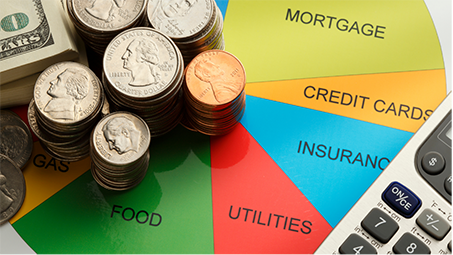You can’t improve what you don’t measure. This is especially true when it comes to your finances. If you don’t regularly keep track of how you spend your money, it can be difficult to get ahead financially. That’s where maintaining a personal budget can help.
Budgeting is a crucial part of personal finance, and there are several apps available that provide a hassle-free way for you to keep tabs on your money. The following five are some of the best options for budgeting and tracking your finances.
1. Mint
Mint is a personal finance app that helps you track and manage your money all in one place. This popular app has thousands of positive reviews in both the App Store and Google Play.
It’s free to use and can sync with various accounts, including checking and savings, credit cards, loans, investments and bills. In terms of actual budgeting, Mint tracks your expenses and categorizes them. These categories are customizable. You set limits, and Mint alerts you when you’re getting close to them.
2. You Need a Budget (YNAB)
Rather than tracking past transactions, this app is intended to help users plan for upcoming financial expenditures. YNAB adheres to the zero-based budgeting system, which requires you to create a plan for every dollar you earn.
You tell YNAB how much of your income should go toward various categories, such as expenses, goals, and savings as soon as you get paid. Using this app teaches you to become more intentional with how you spend and save your money.
YNAB’s website provides a wealth of educational resources outlining how to budget and use the app. You can link your checking and savings accounts and credit cards and loans to YNAB. The app is compatible with phones, desktops, iPad, Apple Watch and Alexa.
3. Goodbudget
Goodbudget focuses on financial planning rather than tracking previous transactions. This app is based on the envelope budgeting system, which requires you to allocate a portion of your monthly income to specific spending categories (called envelopes).
This app will not link your bank accounts. You manually enter account balances (which you can get from your bank’s website), cash amounts, debts and income. The money is then allocated to virtual envelopes.
Goodbudget has a free version that allows for one account, two devices and a limited number of envelopes. Goodbudget Plus, the paid version, offers unlimited envelopes and accounts on up to five devices and other benefits.
4. PocketGuard
PocketGuard’s feature set isn’t the most extensive on our list, but that’s part of why we like it. The app emphasizes simplification.
You can track your bills by connecting your bank accounts, credit cards, loans, and investments. With that information, the app calculates how much money you have left to spend after deducting expenses, bills, and goals.
PocketGuard also tracks our net worth and lets you manually track your finances rather than linking your accounts. PocketGuard Plus, the paid version, includes a debt repayment plan, the ability to export your transactions, and other features.
5. Fudget
Consider Fudget if you don’t want to sync your financial accounts and prefer a simple, calculator-like interface over fancy features.
You create lists of incoming and outgoing money and track your balances in Fudget’s ultra-simple design. There are no budget categories at all. You can also export your budget and other extras with the Pro account.
Now that you know the best budgeting apps for 2023, you are well on your way to financial success. Take your newfound financial awareness and channel it into implementing the best ways to spend less, save more and create a lasting financial legacy.
Join Corporate Counsel Men of Color
Want to grow your career, learn new professional skills and connect with other professional men of color in a variety of industries? Join Corporate Counsel Men of Color today.
Copyright of Corporate Counsel Women of Color®. All Rights Reserved.

